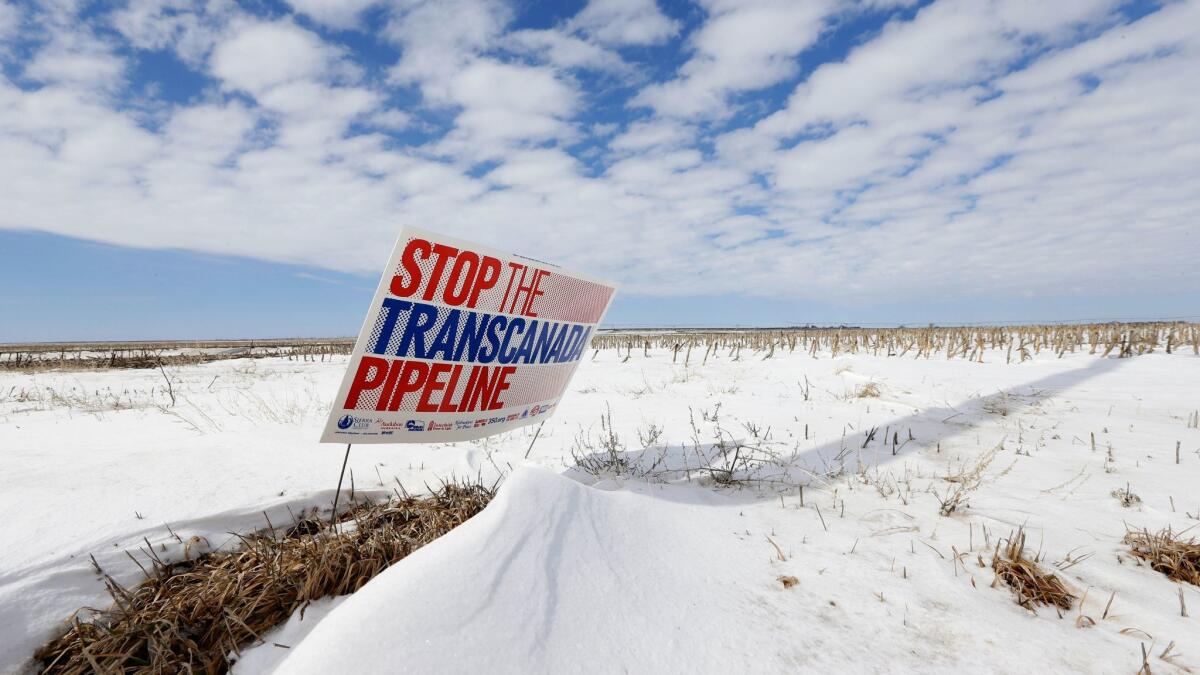Charges dropped against filmmakers arrested while taping pipeline protest
- Share via
Reporting from Seattle — Charges have been dropped against two filmmakers who were potentially facing decades in prison for recording an oil pipeline protest in Washington state, prosecutors said Monday.
Producer Lindsey Grayzel and cameraman Carl Davis were arrested Oct. 11 near Burlington, Wash., while filming climate activist Ken Ward attempting to shut down the Trans Mountain pipeline that runs from Canada to the U.S.
Though a sheriff’s report noted the two were not on pipeline property, their film and equipment were confiscated and they were charged with second-degree burglary, criminal sabotage and assemblage of saboteurs — all felonies.
The arrests came the same day filmmaker Deia Schlosberg was taken into custody at a TransCanada oil pipeline protest in North Dakota, a project that activists contend will enable climate change. She was among at least five filmmakers and self-styled journalists arrested in connection with the protests, which spanned four states.

Schlosberg spent 53 hours in jail for filming the protest and still faces charges that could send her to prison for a maximum of 45 years, prompting this Tweet from secrets leaker Edward Snowdon, accused of espionage:
“This reporter is being prosecuted for covering the North Dakota oil protests. For reference, I face a mere 30 years.”
Ward, the Burlington protester filmed by Grayzel and Davis, still faces charges of burglary, criminal trespass, sabotage and assemblages of saboteurs, for, as he described it in a statement, “closing a safety valve on the Trans Mountain pipeline and blocking the flow of Canadian tar sands oil from Alberta to the Anacortes [Wash.] refineries.
“There is no question about what I did – I livestreamed it,” he said.
He admitted to several other protest actions, saying, “I did these things because I believe that it is the obligation of every thinking person to find a way to stave off climate cataclysm, and there is no effective, legal alternative to personal direct action.”
In September, radio-TV journalist Amy Goodman, host of “Democracy Now!,” was arrested on suspicion of trespassing while covering the Dakota Access pipeline protests, led by the Standing Rock Souix tribe. Activists contend that project will disrupt tribal lands and put their lone supply of drinking water at risk.
Prosecutors last month attempted to charge her with rioting, but a judge said they lacked evidence to do so. Prosecutors said they now are studying other possible charges against Goodman.
In Skagit County, Wash., where Grayzel and Davis had been charged, prosecutors said they may not yet be done, either.
“We have dismissed the charges without prejudice to refilling in the future,” said Rosemary Kaholokula, the chief criminal prosecutor in Skagit County. “Law enforcement continues to investigate this matter .”
According to copies of the court dismissal notices, probable cause was found to support both cases, but, a prosecutor wrote, “at this point in time, the undersigned attorney believes that the state and law enforcement require more time to complete investigation.”
“Unfortunately,” said Grayzel, a Portland documentary producer, in a statement, “our arrests are not unique or isolated incidents. Recently, many members of independent media have been prosecuted for doing our jobs…. I call on everyone who values an independent press to decry this disturbing trend and call for the immediate dismissal of criminal charges for members of the media.”
Authorities have not yet returned the film they confiscated from Grayzel, said Dawn Smallman, a spokeswoman for the filmmaker.
The “ongoing seizure of her camera footage continues to prevent her from editing and disseminating the video of the activist’s action to the public.” she said.
The arrests, she said, “have created a chilling effect for other filmmakers and reporters considering covering the important topics of climate change and political dissent.”
More to Read
Sign up for Essential California
The most important California stories and recommendations in your inbox every morning.
You may occasionally receive promotional content from the Los Angeles Times.










